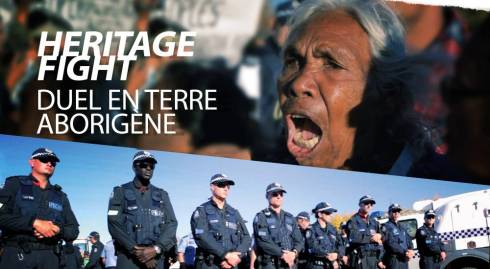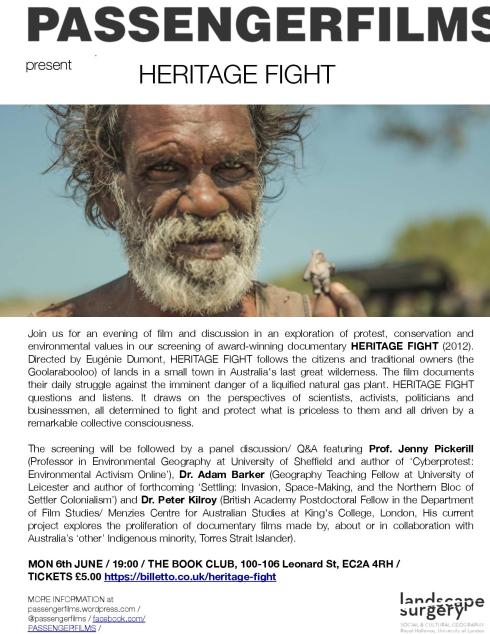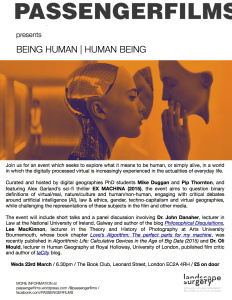[SPOILER ALERT!!!!!]
by Katy Lawn
Passengerfilms is back! Our first event in a while, in collaboration with Precarious Geographies (Ella Harris and Mel Nowiki) and Genesis Cinema, kicked off with a showing of Dan Gilroy’s Nightcrawler. Set in the hyper-precarious world of L.A., this complex and disturbing film raises more questions than you can shake a stick (or – perhaps more appropriately – a cheap camcorder) at.
Having never seen the film before, and not quite knowing what to expect – I have to say that it wasn’t an ‘enjoyable’ watch. That said, the best films are not always ‘enjoyable’. And it was a really, really great film – it’s one of those films you’ll sit and ponder over for hours after it ends. The sense of optimism at the beginning of the film as our protagonist, Lou, starts to make his way – finally gaining skills, money and influence after so many false starts in an impenetrable labour market – slowly crumbles into something nightmarish.
With such a darkly thought-provoking film, the ground was fertile for debate and comment from our two speakers: Dr Oli Mould (Royal Hollway) and Dr Will Davies (Goldsmiths). Much of the initial comments centred on Lou, the protagonist. Was he an embodiment of neoliberal capital itself – expanding and expanding, creating the conditions for expansion and monetary gain at any cost? Or is he symptomatic of the type of personality that that such a system engenders – an automaton, lacking empathy and spouting incessant management-speak?

In any case, it is clear that Lou personifies neoliberal logic in some sense – and this is a logic which produces a degree of precarity. At the very beginning of the film Lou hints at this himself, whilst trying to persuade the owner of a metal yard to give him a job: “Having been raised with the self esteem movement so popular in schools, I used to expect my needs to be considered. But I know that these days, our culture no long caters to the job loyalty that could be promised to earlier generations.” His attempt at securing employment inevitably fails, and it falls to him to create his own opportunities. The shift from secure employment to freelance ‘self made’ workers is emblematic of a precarious labour market and the way in which entrepreneurship and independence are demanded. Lou’s eventual turn to gonzo-crime-scene-paparazzo as a career choice was, then, not really a conscious choice but a last resort. There is an irony at the heart of the film; a contradiction in which Lou embodies these attributes which are praised by the rhetoric of the American dream – making your own opportunities, being an entrepreneurial ‘go-getter’ – but these are eventually writ large to the point of perversion.
In this sense it is possible to say that this is a satirical look at an economic system in which one is actually required to radically overhaul your ‘self’, to alter your subjectivity, until you develop the level of ruthlessness to become rich. If not… you stay a scrap metal thief, living hand to mouth in the dirt of L.A. The exploitation of Rick, Lou’s assistant is also perhaps emblematic of a sort of psychological precarity. If we take Lou as an emblem of neoliberal economics, we can also see that he changes the psychological state of those around him through a baffling mixture of obscure management speak and blackmail. Lou’s immorality is exposed in its fullness when Nina, the veteran news anchor to whom he sells his footage, somewhat reluctantly agrees to go to a Mexican restaurant with him. This is perhaps one of the worst scenes in the film: he blackmails her for sex (in order to secure their working relationship) in a matter-of-fact way: “I have to think you’re invested in this transaction.” Horrified gasps from the audience ensued.

There seems to be an interesting subtext here – something like a cautionary tale. In this film, immorality triumphs. And that’s what makes it such an uncomfortable viewing experience – the audience feels complicit in the horror – watching Lou, being a part of viewing the tragedies he records and augments. And there’s more: the sickening feeling of injustice that those who are predatory and immoral make it to the top of the food chain. In this film, ruthless business expansion seems to win out over morality and humanity. This leaves open the question of whether this is inherently necessary in order to ‘make it’, or whether this is a choice we can make. In some ways, the film turns out to be a tragicomedy of people crossing moral boundaries simply to stay afloat: this is precarity in all its forms – emotional, monetary, psychological, moral.
Many thanks to Mel and Ella for leading the event, and to our wonderful speakers Will Davies and Oli Mould for their thoughts on the film. A huge success – hope to see some of you at our next event in February.








